| Listing 1 - 10 of 42 | << page >> |
Sort by
|
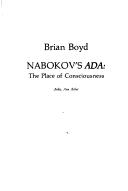
ISBN: 0882339060 Year: 1985 Publisher: Ann Arbor Ardis
Abstract | Keywords | Export | Availability | Bookmark
 Loading...
Loading...Choose an application
- Reference Manager
- EndNote
- RefWorks (Direct export to RefWorks)
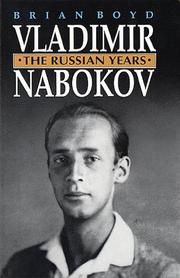
ISBN: 0691067945 0691024707 1400884020 Year: 2016 Publisher: Princeton, NJ : Princeton University Press,
Abstract | Keywords | Export | Availability | Bookmark
 Loading...
Loading...Choose an application
- Reference Manager
- EndNote
- RefWorks (Direct export to RefWorks)
This first major critical biography of Vladimir Nabokov, one of the greatest of twentieth-century writers, finally allows us full access to the dramatic details of his life and the depths of his art. An intensely private man, Nabokov was uprooted first by the Russian Revolution and then by World War II. Transformed into a permanent wanderer, he did not achieve fame until late in life, with the success of Lolita. In this first of two volumes, Brian Boyd vividly describes the liberal milieu of the aristocratic Nabokovs, their escape from Russia, Nabokov's education at Cambridge, and the murder of his father in Berlin. Boyd then turns to the years that Nabokov spent, impoverished, in Germany and France, until the coming of Hitler forced him to flee, with wife and son, to the United States. This volume stands on its own as a fascinating exploration of Nabokov's Russian years and Russian worlds, prerevolutionary and émigré. In the course of his ten years' work on the biography, Boyd traveled along Nabokov's trail everywhere from Yalta to Palo Alto. The only scholar to have had free access to the Nabokov archives in Montreux and the Library of Congress, he also interviewed at length Nabokov's family and scores of his friends and associates. For the general reader, Boyd offers an introduction to Nabokov the man, his works, and his world. For the specialist, he provides a basis for all future research on Nabokov's life and art, as he dates and describes the composition of all Nabokov's works, published and unpublished. Boyd investigates Nabokov's relation to and his independence from his time, examines the special structures of his mind and thought, and explains the relations between his philosophy and his innovations of literary strategy and style. At the same time he provides succinct introductions to all the fiction, dramas, memoirs, and major verse; presents detailed analyses of the major books that break new ground for the scholar, while providing easy paths into the works for other readers; and shows the relationship between Nabokov's life and the themes and subjects of his art.
Authors, American --- -Authors, Russian --- -Russian authors --- American authors --- Biography --- Nabokov, Vladimir Vladimirovich --- Authors, Russian --- Biography. --- Nabokov, Vladimir Vladimirovich, --- -Biography --- Sirin, Vladimir, --- Sirin, Vl. --- Sirin, V. --- Nabokoff-Sirin, Wladimir, --- Sirin, Wladimir Nabokoff-, --- Nabokov, Vladimir, --- Shishkov, Vasiliĭ, --- Набоков, Владимир Владимирович, --- Набоков, Владимир, --- נאבוקוב, ולאדימיר ולאדימירוביץ׳, --- נאבוקוב, ולאדימיר, --- נבוקוב, ולדימיר, --- 納布可夫, --- Godunov-Cherdynt︠s︡ev, Fedor --- Authors [Russian ] --- 20th century --- Authors [American ] --- Nabokov, Vladimir Vladimirovich, 1899-1977 - Biography. --- Authors, Russian - 20th century - Biography. --- Authors, American - 20th century - Biography.
Book
ISBN: 0701137002 Year: 1990 Publisher: London Chatto and Windus
Abstract | Keywords | Export | Availability | Bookmark
 Loading...
Loading...Choose an application
- Reference Manager
- EndNote
- RefWorks (Direct export to RefWorks)
Authors, American --- Authors, Russian --- Ecrivains américains --- Ecrivains russes --- Biography --- Biographies --- Nabokov, Vladimir Vladimirovich, --- 820 "19" NABOKOV, VLADIMIR --- Engelse literatuur--20e eeuw. Periode 1900-1999--NABOKOV, VLADIMIR --- 820 "19" NABOKOV, VLADIMIR Engelse literatuur--20e eeuw. Periode 1900-1999--NABOKOV, VLADIMIR --- Ecrivains américains --- Biography.
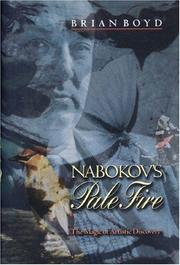
ISBN: 0691009597 0691089574 9786612505584 1282505580 1400823196 1400811112 9781400823192 9781400811113 9780691009599 9780691089577 9781282505582 6612505583 1400800889 Year: 2001 Publisher: Princeton, NJ
Abstract | Keywords | Export | Availability | Bookmark
 Loading...
Loading...Choose an application
- Reference Manager
- EndNote
- RefWorks (Direct export to RefWorks)
Pale Fire is regarded by many as Vladimir Nabokov's masterpiece. The novel has been hailed as one of the most striking early examples of postmodernism and has become a famous test case for theories about reading because of the apparent impossibility of deciding between several radically different interpretations. Does the book have two narrators, as it first appears, or one? How much is fantasy and how much is reality? Whose fantasy and whose reality are they? Brian Boyd, Nabokov's biographer and hitherto the foremost proponent of the idea that Pale Fire has one narrator, John Shade, now rejects this position and presents a new and startlingly different solution that will permanently shift the nature of critical debate on the novel. Boyd argues that the book does indeed have two narrators, Shade and Charles Kinbote, but reveals that Kinbote had some strange and highly surprising help in writing his sections. In light of this interpretation, Pale Fire now looks distinctly less postmodern--and more interesting than ever. In presenting his arguments, Boyd shows how Nabokov designed Pale Fire for readers to make surprising discoveries on a first reading and even more surprising discoveries on subsequent readings by following carefully prepared clues within the novel. Boyd leads the reader step-by-step through the book, gradually revealing the profound relationship between Nabokov's ethics, aesthetics, epistemology, and metaphysics. If Nabokov has generously planned the novel to be accessible on a first reading and yet to incorporate successive vistas of surprise, Boyd argues, it is because he thinks a deep generosity lies behind the inexhaustibility, complexity, and mystery of the world. Boyd also shows how Nabokov's interest in discovery springs in part from his work as a scientist and scholar, and draws comparisons between the processes of readerly and scientific discovery. This is a profound, provocative, and compelling reinterpretation of one of the greatest novels of the twentieth century.
820 "19" NABOKOV, VLADIMIR --- Engelse literatuur--20e eeuw. Periode 1900-1999--NABOKOV, VLADIMIR --- 820 "19" NABOKOV, VLADIMIR Engelse literatuur--20e eeuw. Periode 1900-1999--NABOKOV, VLADIMIR --- Nabokov, Vladimir Vladimirovich, -- 1899-1977. -- Pale fire. --- English --- Languages & Literatures --- American Literature --- Nabokov, Vladimir Vladimirovich, --- LITERARY CRITICISM / European / General. --- Literature --- History and criticism. --- Appraisal of books --- Books --- Evaluation of literature --- Criticism --- Literary style --- Appraisal --- Evaluation
Book
ISBN: 9780674057111 9780674033573 0674033574 0674053591 0674057112 Year: 2009 Publisher: Cambridge Belknap press of Harvard university press
Abstract | Keywords | Export | Availability | Bookmark
 Loading...
Loading...Choose an application
- Reference Manager
- EndNote
- RefWorks (Direct export to RefWorks)
A century and a half after the publication of Origin of Species, evolutionary thinking has expanded beyond the field of biology to include virtually all human-related subjects—anthropology, archeology, psychology, economics, religion, morality, politics, culture, and art. Now a distinguished scholar offers the first comprehensive account of the evolutionary origins of art and storytelling. Brian Boyd explains why we tell stories, how our minds are shaped to understand them, and what difference an evolutionary understanding of human nature makes to stories we love. Art is a specifically human adaptation, Boyd argues. It offers tangible advantages for human survival, and it derives from play, itself an adaptation widespread among more intelligent animals. More particularly, our fondness for storytelling has sharpened social cognition, encouraged cooperation, and fostered creativity. After considering art as adaptation, Boyd examines Homer’s Odyssey and Dr. Seuss’s Horton Hears a Who! demonstrating how an evolutionary lens can offer new understanding and appreciation of specific works. What triggers our emotional engagement with these works? What patterns facilitate our responses? The need to hold an audience’s attention, Boyd underscores, is the fundamental problem facing all storytellers. Enduring artists arrive at solutions that appeal to cognitive universals: an insight out of step with contemporary criticism, which obscures both the individual and universal. Published for the bicentenary of Darwin’s birth and the 150th anniversary of the publication of Origin of Species, Boyd’s study embraces a Darwinian view of human nature and art, and offers a credo for a new humanism.
Fiction --- kunst --- literatuur --- narratologie --- biologie --- evolutieleer --- kunsttheorie --- 7.01 --- Authorship. --- History and criticism --- Theory, etc. --- History and criticism. --- Authorship --- Fiction writing --- Writing, Fiction --- Storytelling --- Evolutionary psychology. --- Psychology and literature. --- History. --- Fiction - History and criticism - Theory, etc. --- Fiction - Authorship --- Roman --- Roman -- Art d'écrire --- Histoire et critique --- théorie, etc. --- Roman -- Art d'écrire --- théorie, etc.
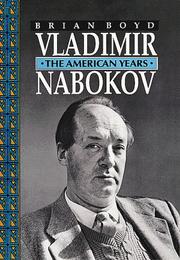
ISBN: 069106797X Year: 1993 Publisher: Princeton (N.J.): Princeton university press
Abstract | Keywords | Export | Availability | Bookmark
 Loading...
Loading...Choose an application
- Reference Manager
- EndNote
- RefWorks (Direct export to RefWorks)
820 "19" NABOKOV, VLADIMIR --- Authors, American --- -American authors --- 820 "19" NABOKOV, VLADIMIR Engelse literatuur--20e eeuw. Periode 1900-1999--NABOKOV, VLADIMIR --- Engelse literatuur--20e eeuw. Periode 1900-1999--NABOKOV, VLADIMIR --- Biography --- Nabokov, Vladimir Vladimirovich --- -Nabokov, Vladimir Vladimirovich --- -Criticism and interpretation --- Homes and haunts --- -Authors, American --- Authors, Russian --- Ecrivains américains --- Ecrivains russes --- Biographies --- Nabokov, Vladimir Vladimirovich, --- Criticism and interpretation. --- Critique et interprétation --- Résidences et lieux familiers --- Sirin, Vladimir, --- Sirin, Vl. --- Sirin, V. --- Nabokoff-Sirin, Wladimir, --- Sirin, Wladimir Nabokoff-, --- Nabokov, Vladimir, --- Shishkov, Vasiliĭ, --- Набоков, Владимир Владимирович, --- Набоков, Владимир, --- נאבוקוב, ולאדימיר ולאדימירוביץ׳, --- נאבוקוב, ולאדימיר, --- נבוקוב, ולדימיר, --- 納布可夫, --- Godunov-Cherdynt︠s︡ev, Fedor --- United States --- Intellectual life --- Biography.
Book
ISBN: 0099962306 Year: 1993 Publisher: London Vintage
Abstract | Keywords | Export | Availability | Bookmark
 Loading...
Loading...Choose an application
- Reference Manager
- EndNote
- RefWorks (Direct export to RefWorks)
Book
ISBN: 0674064844 0674069196 9780674069190 9780674064843 9780674065642 0674065646 Year: 2012 Publisher: Cambridge, MA
Abstract | Keywords | Export | Availability | Bookmark
 Loading...
Loading...Choose an application
- Reference Manager
- EndNote
- RefWorks (Direct export to RefWorks)
In Why Lyrics Last, the internationally acclaimed critic Brian Boyd turns an evolutionary lens on the subject of lyric verse. He finds that lyric making, though it presents no advantages for the species in terms of survival and reproduction, is "universal across cultures because it fits constraints of the human mind." An evolutionary perspective- especially when coupled with insights from aesthetics and literary history-has much to tell us about both verse and the lyrical impulse. Boyd places the writing of lyrical verse within the human disposition "to play with pattern," and in an extended example he uncovers the many patterns to be found within Shakespeare's Sonnets. Shakespeare's bid for readership is unlike that of any sonneteer before him: he deliberately avoids all narrative, choosing to maximize the openness of the lyric and demonstrating the power that verse can have when liberated of story. In eschewing narrative, Shakespeare plays freely with patterns of other kinds: words, images, sounds, structures; emotions and moods; argument and analogy; and natural rhythms, in daily, seasonal, and life cycles. In the originality of his stratagems, and in their sheer number and variety, both within and between sonnets, Shakespeare outdoes all competitors. A reading of the Sonnets informed by evolution is primed to attend to these complexities and better able to appreciate Shakespeare's remarkable gambit for immortal fame.
Sonnets, English --- Lyric poetry --- History and criticism. --- Shakespeare, William,
Book
ISBN: 0701137010 Year: 1992 Publisher: London Chatto and Windus
Abstract | Keywords | Export | Availability | Bookmark
 Loading...
Loading...Choose an application
- Reference Manager
- EndNote
- RefWorks (Direct export to RefWorks)
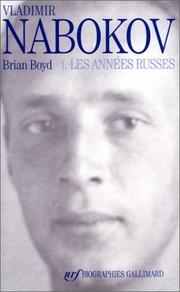
ISBN: 207072509X 207073112X Year: 1992 Publisher: Paris : Gallimard,
Abstract | Keywords | Export | Availability | Bookmark
 Loading...
Loading...Choose an application
- Reference Manager
- EndNote
- RefWorks (Direct export to RefWorks)
Authors, Russian --- Authors, American --- Ecrivains russes --- Ecrivains américains --- Biography --- Biography --- Biographies --- Biographies --- Nabokov, Vladimir Vladimirovich, --- Biography.
| Listing 1 - 10 of 42 | << page >> |
Sort by
|

 Search
Search Feedback
Feedback About UniCat
About UniCat  Help
Help News
News